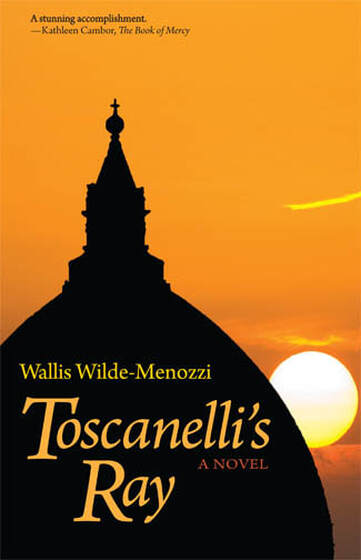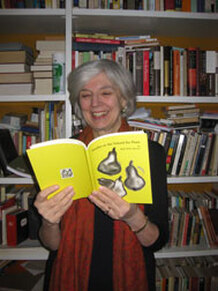|
This stunning first novel is set in Florence in 1994 in the hours before the arrival of the ray of sun that will announce the summer solstice in Brunelleschi’s cathedral. In a gripping, smart narration, the reader discovers how human threads bind importantly with one another and how free choices flood every minute. As the light moves through the magnificent and weary city in Toscanelli’s Ray, Milli, a Nigerian prostitute, finds herself questioned in the police office. Susan, an American sand therapist, suddenly decides to admit to her excavation of an Etruscan woman buried in her villa garden. Luigi, her ex-husband, storms over his relationship with his university assistant that has generated a child. These situations unfold as the characters, entirely different and mysteriously equal, are spun into making new pacts. Radiating from their memories as well as events in Florence, lyrical rhythms build from the characters’ voices. When another prostitute decides to leave Milli’s child, Farina, in a convent when Milli fails to appear, no reader will remain untouched by the little girl’s hours with the nuns. As this new global fiction spins out, the sun rises over Milli’s son who is toying with political rebellion in Port Harcourt. Over Susan’s mother who is preparing to taste a trucking life in Minneapolis. Over the sand-therapist’s lover dying in Prague and over a peasant couple who no longer accept Florence’s corrupt indifference. Each character strains to hold a balance. The sun and heavens are part of the action, as is the underground. In swells of hope, this groundbreaking work moves through loss and transformation. The voices and events weave into one unforgettable story where all humanity binds, for seconds at a time, as the characters discover there is no elsewhere. About the Author
Wallis Wilde-Menozzi, a distinguished American poet, essayist and novelist, has lived in Parma, Italy, for three decades. Mother Tongue, An American Life in Italy, North Point Press, reviewed by the New Yorker as “full of enchantment," “highly original," and The Other Side of the Tiber, Farrar Straus and Giroux, scheduled for publication Winter 2012, are both part of a new language born from cross-culture. Wallis' work has attracted a devoted following on both sides of the Atlantic; her poetry has won many prizes and has been both anthologized and translated. Her essays continue to appear in myriad journals from Agni to the Kenyon Review; they have been translated into Italian as L'Oceano e' dentro di noi, Moretti e Vitali, 2011. Toscanelli's Ray, her first novel, was five years in the writing. |
Toscanelli's Ray
by Wallis Wilde-Menozzi Photographs by Franco & Francesco Furoncoli and David Battistella First edition 2013 334 pages, 5½" x 8½" ISBN 0-9780932274748 $16.95 About the Book
Translation from the Italian of a review of Toscanelli’s Ray by A.P.S. A highly original novel. In a class by itself. Breathtaking. The reader is immediately taken by surprise: The crowd of characters animating the novel don’t make any sounds, the events that fill their days, past and present take their thoughts far-off and pose questions for us through signs of exile and tenacity in the fabric of their existences. As the pages’ flow, the reader always seems about to face something much more important in events--that is, something that remains hidden in daily life--which in this book sheds its appearance of insignificance and habit and, instead, assumes dimensions of mystery and, thus, fascination. I find it extraordinary that Wallis Wilde-Menozzi does not appear in her book as a narrator of facts or a creator of characters with their logic and predictable trajectories but as if she, too, does not know what will happen tomorrow, just as few know what happened yesterday; she seems not to follow an idea but to wait for events to unfold into what they will be, what will become reality, not “destiny.” I believe that it can be said for all the characters of Toscanelli’s Ray that they possess real lives, and come close to feeling like living beings, which is a rare occurrence in novels. They come alive animated by restlessness and innocence, unknowing and continuous trials. The author’s style is like the book, new, original, with a stunning beauty that seems absolutely a consequence of her being the author of poetry and poems. I think that it is for this reason, given that Wallis Wilde-Menozzi is a poet writing in prose, that the novel has neither a beginning nor an end: it is a suspension, full stop. Toscanelli’s Ray represents a rare literary event, which will more than satisfy the needs of large numbers of readers and occupy space reserved for a sophisticated public; but I am certain that it can, maybe as a surprise, reach and conquer a larger public which, as sometimes marvelously happens, will give the book deserved success beyond that which will rightly be bestowed on it by critics and awards. Toscanelli’s Ray is a brave and wonderfully ambitious book, a meditation on memory, identity and history. It is both a love song to the city of Florence, its ancient beauty and tangled history, and a cleared-eyed examination of the cracks and fissures that the new millennium has thrust upon it. In the course of a single day, Wilde-Menozzi’s remarkable characters (including a long-dead Etruscan woman) circle, engage, damage and heal each other in ways that never cease to surprise. This is a novel of big ideas, one that raises provocative questions about immigration, difference and culture—even our notion of time itself, and simultaneously it is a novel full of the stuff of life—passion, guilt, betrayal, politics, and marriage. A stunning accomplishment, and Wilde-Menozzi’s generous heart and lucid intelligence illuminate each page. —Kathleen Cambor, The Book of Mercy Wallis Wilde-Menozzi’s stunning novel digs deep to unearth the new Italian mosaic: the Americans and Florentines are still here, alongside the Etruscans, but so are the Nigerians, and the Eastern Europeans. Can Florence rise again to spark a new renaissance? Her intricately woven narratives, tough and elegant, illuminate the afterlife of the humanist dream as only the best fiction can. —Askold Melnyczuk, The House of Windows Toscanelli’s Ray is an epic tale set in Florence with its ancient glory, its new graffiti, its bourgeoise, expatriates and illegal immigrants. Through rich mosaic-like fragments we glimpse the utter strangeness of our own lives in the twenty-first century. Voices from the global south, lives lived at the edge, in penury, without papers force a new reckoning of what Europe might be. Wallis Wilde-Menozzi’s language is iridescent, her grasp of the complexity of human time so sure, her sense of intimacy unerring. — Meena Alexander, Fault Lines Modern fiction often adopts Dante’s populous weaving of human destinies: Melville’s whaler deck, or Woolf’s dining table in Mrs Dalloway. Happily this novel renews the contract. Farina, the Nigerian child at its focus, is also the flour whose name crosses from Latin into Italian and English. Of course she comes to matter intensely, but so does the annual solar event in the Duomo which makes this writer’s global Florence into our Chichen Itza, Chaco Canyon, or Montségur: a shrine to alignments amid spinning flow, at one moment and one angle visible. “The solution, the song, the prayer was the child. Farina. The light that needed to be extended.” —John Peck, Contradance |
Cadmus Editions
[email protected]
[email protected]


